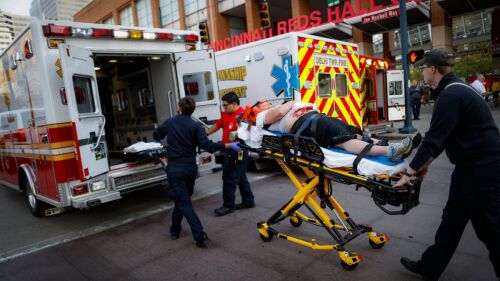By Doug Wyllie
The months of June, July, August, and September tend to bring a wee bit more of the crazy than is typical in the dead of winter. The Independence Day holiday, in particular, can increase exponentially the number of intoxicated patients and bystanders you’re likely to encounter on your shift. Here are 10 basic reminders as you head out for what is sure to be a long shift on July 4th.
1. Fireworks can be weapons. Don’t disregard that fact if you’re making contact with partiers.
2. Drunk drivers can hit you, too — both while working at a motor vehicle collision and when you’re driving to or from the station. Watch the road and use L.C.E.S.
3. The 4th can be hot and humid. If you’re working, stay hydrated. Keep a water bottle with you in the ambulance and refill it regularly.
4. Do the math on the potential for violence. Lots of people plus 4th of July alcohol consumption plus heat equals recipe for disaster. Stay sharp and maintain situational awareness. Remember that drinking and a charged up crowd can inspire some people to be more confrontational with police and paramedics than they would normally be. Be ready for confrontation and to seek cover or concealment.
5. Crowds can quickly get unruly during mass celebrations. Be smart and wait for back-up from law enforcement if you predict you might need it.
6. Wear your body armor. If it is issued to you, wear it!
7. Bone up on your holiday-specific trauma care. Are you ready for the treatment of amputations, burns, a bottle rocket to the eye, alcohol intoxication, opioid overdose and dehydration?
8. Don’t forget your own kids. You likely caution others about the dangers of screwing around with fireworks (and other explosives), drunk driving, or drinking too much. Make sure your own kids are included in that discussion.
9. Refresh yourself on water rescue protocol and procedures. Lots of people are in and around the water during the 4th weekend. Be ready if you’re called to a water-related incident. Before going in, on or near the water correctly don a department-issued personal flotation device.
10. Make sure you’ve got a fire extinguisher in your ambulance. With fireworks being lit, the potential for a fire is definitely there. If you’re prepared to act early, you can help avoid a bigger problem. Read next: The gear that we carry: How much should go into the scene with us?
The Independence Day holiday always serves as a powerful reminder of why our country is great. Be proud of what you do to protect it. We certainly are. Stay safe out there, always.
About the author
Doug Wyllie writes police training content on a wide range of topics and trends affecting the law enforcement community. Doug was a co-founder of the Policing Matters podcast and a longtime co-host of the program.
This article, originally published July 1, 2016, has been updated.























